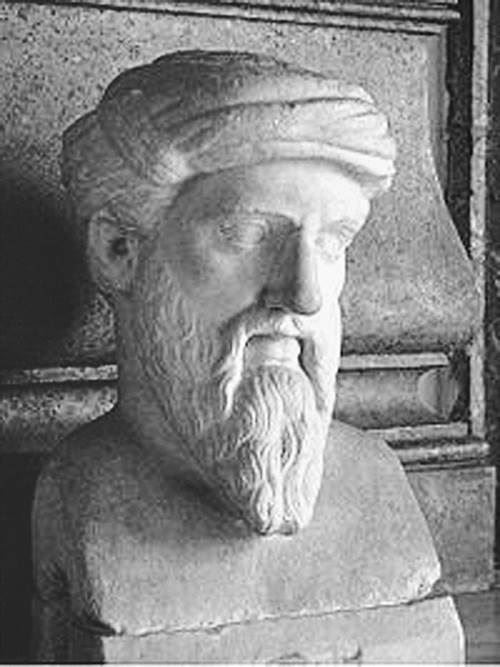 Pythagoras head statue in the Roman Museum of Capitolinus.
Pythagoras head statue in the Roman Museum of Capitolinus.
"The universe is written in the language of mathematics, and its spelling is triangles, circles, and other geometric shapes. Without it, humans cannot understand a single letter."
What the hell is this supposed to mean? Is the universe really written in mathematical language? Then how can I know that? Why is it supposed to be like that? What's the connection between unverse and mathematics? And in that sense, Newton's famous laws of motion and universal gravitation are written in formulas, and Einstein's theory of relativity is also described in gravitational equations. Not only that, but modern physics is all written in esoteric mathematics.
We know that Pythagoras (BC 572-497), who lived 1,100 years ahead of Galileo Galilei, claimed that "all things are numbers." It means that the components of the universe are numbers, and at the same time, the principle of operation of all things follows mathematical laws. Perhaps he had a much deeper philosophy of mathematics thanGalilei. So to find out the relationship between universe and mathematics, it would be tappropriate to go to Pythagoras first.
Pythagoras was born on Samos, a small island on the Asia Minor (today off Turkey) side of the Aegean Sea. This island is also the place where Icarus of Greek mythology flew too high in the sky and the wax melted and crashed.
Pythagoras is actually more of a mythical figure. He is the founder of number theory and a great scholar who built the ancient 'golden age of mathematics'. Thanks to his genius, numbers are able to function in a unique way, away from simple calculation tools.
Pythagoras is said to have studied under Thales of Milletus, the first philosopher, for many years. It is said that he traveled to Egypt as well as Babylon several times. Some claim that they went all the way to India and England. In Egypt, he appears to have met with several priests who are archivists of historical records to discuss and study numbers and mathematics. At that time, Egypt was studying mathematics and geometry with the practical purpose of determining the farmland submerged by the Nile River.
Pythagoras, who learned many mathematical rules, returned to his hometown. He wanted to establish an academy to study mathematics and philosophy with progressive and open-minded young people. However, his hometown was not a free atmosphere before. Polycrates, the new despot who ascended the throne during his travels. He offered Pythagoras a high-ranking government post and ordered him to return to Samos. But Pythagoras saw that it was a kind of trick to keep his mouth shut, politely declined Polycrates' invitation and began meditation by living in a cave on the outskirts of Samos Island.
Around this time, a famous anecdote about Pythagoras is told. He introduced a boy as his first disciple. Each time his student took a course, he gave him three obols (one-sixth of an ancient Greek silver coin. One drachma is equivalent to a daily wage of an ancient Greek worker). It even mobilized wealth to stimulate intellectual curiosity among students who did not want to take lectures. One day Pythagoras lied to test his student, saying, "Now I'm out of money, so I can't continue my lecture anymore," and the boy begged, "I'll pay for the lecture, so please keep teaching me."
Realizing that he could not achieve his meaning in learning and education, Pythagoras left his hometown with his mother and disciple. He settled in Crotton, southern Italy, which belonged to Greece at the time. There, he luckily meets an ideal sponsor. He is Milon, one of the city's richest men in power. Milon is said to have been more famous than Pythagorean, who is praised as 'the wise man of Samos.' He was an outstanding figure, winning twelve Olympic games and Apolon's celebratory festivals. However, he was as interested in philosophy and mathematics as much as in sports, and helped Pythagoras make the Academy. Pythagorean Brotherhood was formed here and spent more than 20 years studying mathematics and philosophy.
Pythagoras' research has great significance that can never be underestimated from today's point of view. He found that numbers exist independently regardless of the real world. Today's mathematics community calls this 'numerical realism'.
He also tried to prove it strictly mathematically. He taught, "Don't dwell on past traditions or teachings, but come to a conclusion based on 'perfect logic that can't be refuted.' He also stressed, "It is not myths or superstitions that dominate this world, but numbers and geometry." The first to adopt the concept of proof was Thales, the first philosopher, but it was Pythagoras and his disciples (Pythagorean) who applied it to prove the fact that it was "not apparent at first glance."
Pythagoras also studied numbers and mathematics systematically, with an early insight into the fact that they dominate nature. So he established a mathematical view that the universe was composed of numbers and operated according to mathematical laws.
<Author>